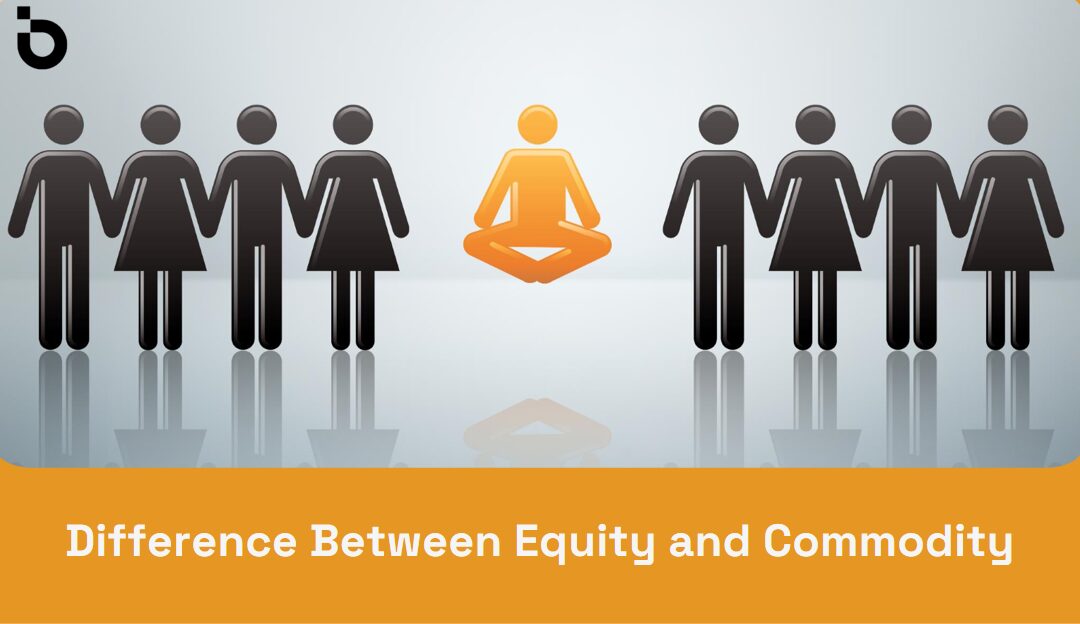In the world of finance and investments, two terms that often come up in discussions are equity and commodity. Both play significant roles in various markets and offer potential opportunities for investors. However, they are distinct in nature and have their own characteristics and dynamics. In this article, we will delve into the difference between equity and commodity, exploring their definitions, features, and the relationship between the equity and commodity markets.
Table of contents
- 1. Introduction: Equity and Commodity Explained
- 2. Equity: Ownership in Companies
- 3. Commodity: Tangible Goods or Raw Materials
- 4. Key Differences between Equity and Commodity
- 5. Equity vs. Commodity: Risk and Volatility
- 6. Relationship between Equity and Commodity Markets
- 7. Equity and Commodity Derivatives
- 8. Choosing between Equity and Commodity: Factors to Consider
- 9. Are Commodities Safer than Stocks?
- 10. Conclusion
- Frequently Asked Questions (FAQs)
1. Introduction: Equity and Commodity Explained
Before diving into the differences between equity and commodity, it’s essential to understand their respective definitions.
Equity refers to shares or stocks that represent ownership in a company. When individuals or institutions purchase shares of a company, they become shareholders and hold a proportional ownership stake in the company’s assets and profits. Equity investments are commonly associated with the stock market.
On the other hand, commodities are tangible goods or raw materials that are commonly traded in the market. They include items such as gold, oil, wheat, natural gas, and more. Commodity trading involves buying and selling contracts for these goods, with prices often influenced by supply and demand dynamics.
2. Equity: Ownership in Companies
Equity represents ownership in companies, entitling shareholders to certain rights and privileges. When individuals buy shares of a company, they essentially become partial owners of that company. Shareholders have the potential to benefit from the company’s growth in the form of dividends and capital appreciation.
Equity investments offer individuals the opportunity to participate in the success of a company. They can buy shares of established corporations or invest in promising startups with high growth potential. The value of equity shares is influenced by various factors, including the company’s financial performance, industry trends, and market sentiment.
3. Commodity: Tangible Goods or Raw Materials
Commodities, unlike equity, are physical goods or raw materials that have value and can be traded. They are often categorized into two types: hard commodities and soft commodities. Hard commodities include items like gold, silver, oil, natural gas, copper, and other metals. Soft commodities include agricultural products like wheat, corn, coffee, sugar, and more.
Commodity markets exist to facilitate the trading of these goods. Investors can participate in commodity markets by trading futures contracts, which represent agreements to buy or sell a specific quantity of a commodity at a predetermined price and date in the future. Commodities are influenced by factors such as weather conditions, geopolitical events, and global supply and demand trends.
4. Key Differences between Equity and Commodity
Now that we have established the definitions of equity and commodity let’s explore their key differences:
- Ownership vs. Physical Goods: Equity represents ownership in companies, while commodities are physical goods or raw materials.
- Income Generation: Equity investments can generate income through dividends, while commodities generally do not provide regular income.
- Risk and Volatility: Equity investments can be subject to market volatility and company-specific risks, while commodities are exposed to price fluctuations influenced by supply and demand dynamics.
- Investment Horizons: Equity investments are typically considered long-term investments, while commodity investments can involve both short-term and long-term trading strategies.
- Market Access: Equity markets are more accessible and liquid compared to commodity markets, which can have higher barriers to entry and lower trading volumes.
5. Equity vs. Commodity: Risk and Volatility
One of the crucial aspects to consider when differentiating between equity and commodity is the level of risk and volatility associated with each.
Equity investments can be volatile, as stock prices can fluctuate based on a variety of factors, including market conditions, economic indicators, and company-specific news. However, with thorough research and analysis, investors can identify companies with strong fundamentals and growth prospects.
Commodities, on the other hand, are influenced by supply and demand dynamics, geopolitical events, and global economic factors. These factors can lead to significant price fluctuations, making commodity markets more volatile compared to equity markets.
6. Relationship between Equity and Commodity Markets
The equity and commodity markets are interconnected, with certain relationships and correlations between them. Understanding these relationships can help investors make informed decisions.
In general, the relationship between equity and commodity markets can be described as follows:
- Commodity Prices and Equity Sectors: Changes in commodity prices can impact specific equity sectors. For example, rising oil prices may benefit energy companies, while falling agricultural commodity prices may affect the performance of agricultural companies.
- Inflation and Commodity Investments: Commodities are often considered a hedge against inflation. During periods of high inflation, the value of commodities may increase, providing a potential safeguard for investors.
- Investor Sentiment and Asset Allocation: Investor sentiment in either the equity or commodity markets can influence asset allocation decisions. Positive sentiment in equity markets may lead to increased investment in equities, while negative sentiment may drive investors toward commodities.
7. Equity and Commodity Derivatives
Both equity and commodity markets offer derivative instruments that enable investors to gain exposure to these assets without directly owning them.
In the equity market, derivatives such as options and futures contracts allow investors to speculate on the price movements of stocks or indexes. These instruments provide leverage and flexibility, allowing investors to manage risk and potentially enhance returns.
Similarly, in commodity markets, derivative instruments like futures and options contracts allow investors to trade commodities without owning the physical assets. Commodity derivatives offer opportunities for hedging, speculation, and risk management.
8. Choosing between Equity and Commodity: Factors to Consider
When deciding between equity and commodity investments, several factors should be considered:
- Investment Goals: Clarify your investment goals and objectives. Determine whether you are seeking long-term capital appreciation, regular income, or diversification.
- Risk Tolerance: Assess your risk tolerance and understand the potential risks and volatility associated with both equity and commodity investments.
- Market Conditions: Analyze current market conditions, economic indicators, and trends to make informed investment decisions.
- Diversification: Consider diversifying your portfolio by allocating investments across different asset classes, including equity and commodities.
9. Are Commodities Safer than Stocks?
The safety of commodities compared to stocks is subjective and depends on individual preferences, risk tolerance, and investment strategies. Commodities and stocks have distinct risk profiles, and investors should evaluate their risk appetite and goals before making investment decisions.
Commodities, as tangible assets, may offer a degree of security in times of economic uncertainty or inflation. They can provide a hedge against currency devaluation and offer potential returns based on supply and demand dynamics.
Stocks, on the other hand, represent ownership in companies and can offer the potential for long-term capital appreciation and dividends. They are influenced by company-specific factors and market conditions.
10. Conclusion
In conclusion, understanding the difference between equity and commodity is essential for investors seeking to navigate the financial markets. Equity represents ownership in companies, while commodities are tangible goods or raw materials. Both asset classes have their own characteristics, risk profiles, and market dynamics.
Investors should carefully evaluate their investment goals, risk tolerance, and market conditions when considering equity or commodity investments. Diversification across asset classes can provide a balanced portfolio and potentially reduce risk.
Frequently Asked Questions (FAQs)
1. Are commodities better than stocks for investment? Commodities and stocks have different characteristics and offer unique investment opportunities. The choice between the two depends on individual preferences, risk tolerance, and investment goals.
2. Which market is more volatile, equity, or commodity? Commodity markets tend to be more volatile compared to equity markets due to factors such as supply and demand dynamics and geopolitical events.
3. Can I invest in both equity and commodities simultaneously? Yes, investors can allocate their portfolio across both equity and commodity investments to diversify their holdings and manage risk.
4. Do commodities provide regular income like stocks? Commodities generally do not provide regular income like stocks through dividends. However, commodity investments can offer potential returns based on price fluctuations.
5. How are equity and commodity markets related? The equity and commodity markets are interconnected, with certain relationships and correlations between them. Changes in commodity prices can impact specific equity sectors, and investor sentiment in either market can influence asset allocation decisions.

